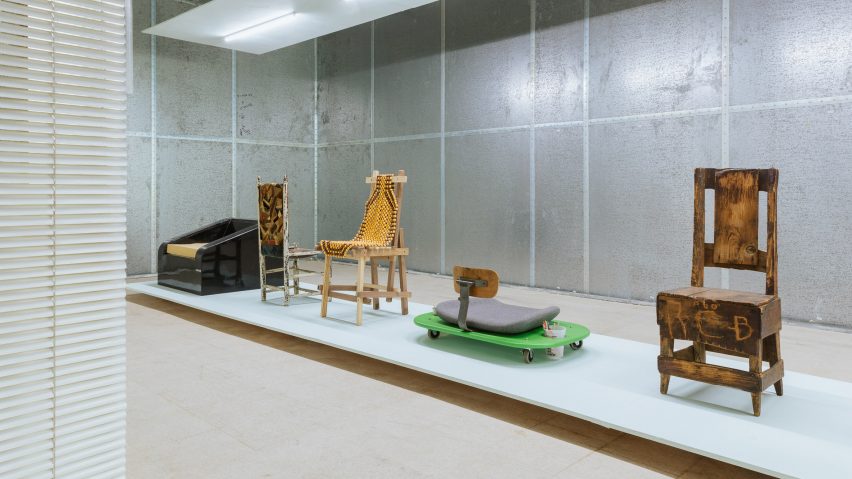Tyres, walking frames and branches from New York's public parks are among the materials salvaged to form 24 chairs, as part of an exhibition that Marta gallery and auction house Catalog Sale are hosting inside an abandoned Chinatown building for NYCxDesign.
The Make-Do project pairs a dozen newly commissioned pieces from local studios with a dozen historical chairs curated by Catalog Sale and created between the 1880s and 2010s.
Sourced from all over the US, these archival pieces are examples of impromptu seating designs by anonymous everyday people that were born out of necessity and circumstance, such as an armchair made from stacked tyres in a California car repair shop.
To encourage this same ad-hoc approach for the new commissions, Marta and Catalog Sale devised an almost game show-style format, asking 12 New York studios to make a chair in only three days – with one day dedicated to material sourcing, one for planning and the last for building.
"It's interesting because it prompts a designer or an artist to prize materials that they have on hand," Marta co-founder Benjamin Critton told Dezeen. "So taking things that are unloved or under-loved and giving them a new life."
"For us, it was also an opportunity to engage specifically with New York-based designers, who we find often have to make do in many ways."
In keeping with this ad-hoc spirit, the exhibition during NYCxDesign is housed inside a building in Chinatown that dates back to 1913 and once served as a bank, a nightclub and a medical imaging centre but has stood empty for the past 10 years.
These different layers of history are still visible on the building's interior, where the 24 "improvised chairs" were placed in aesthetic dialogue to compare and contrast the new and historic works, dating back all the way to the 1880s.
Furniture designer Minjae Kim built a rocking chair using scrap wood from his own studio, which is presented alongside a DIY chair from the 1940s with a similarly oversized backrest made from repurposed ammunition crates.
Nearby, an armchair that was carefully engineered from cardboard boxes and found on the streets of New York is paired with an equally monolithic stoneware seat by Brooklyn artist Isabel Rower, which was formed using a cardboard mould.
"Isabel mentioned to me when she was bringing it over that she had always been concerned about making and firing a big clay chair," said Catalog Sale founder Avi Kovacevich. "But the prompt made her think: let me just try."
"The prompt is quite freeing," agreed Marta's other half Heidi Korsavong. "Because you're only allowed to construct the chair in one day, there is no judgement on the expert finishing. It becomes this really wonderful celebration of experimentation and free thinking."
Many of the historic designs were crafted from whatever was on hand at the time, among them a sling seat made from a rug that was found in a carpet warehouse.
Mirroring this approach, many of the contemporary designers scoured their own studios for waste materials from previous projects that they could repurpose.
Chen Chen & Kai Williams used cast steel fixings, left over from a sculpture the duo created in 2014, to stabilise their Pineal Lobotomy chair, with a frame made from branches found in nearby public parks.
And woodworker Shaina Tabak constructed a simple chair from salvaged timber, decorated with sheet-metal offcuts from a mirror she made for Brooklyn nightclub Rash.
"Shana does really exacting woodwork and she really endearingly said: I'm not sure if I can make a chair in three days," Critton recalled. "And we were like: of course you can."
"Anyone can make a chair in three days. These universal briefs are really exciting to us in that almost anyone could execute them."
Others found discarded materials further afield, with woodworker Samuel Brockman using a bisected stainless steel sink for a seat and a walking frame for a base.
And the Chair for the Bottom of the Drawing by artist Miles Huston consists of a four-wheeled creeper trolley, used by mechanics to access the underside of a car, topped with a cushion from one of Knoll's Womb chairs.
Another update on a classic seating design comes from artist Sarah Burns, who created a modern take on a low-slung slipper chair – a somewhat outdated chair typology designed specifically for putting on shoes – complete with a dedicated slipper compartment.
Also included in the exhibition are works from two duos: painter Georgia McGovern and her partner, architect Sebastijan Jemec, as well as artists Kristen Wentrcek and Andrew Zebulon.
Other contributors include Nigerian-American designer Nifemi Ogunro, ceramicist Joseph Algieri and Brendan Timmins, who specialises in creating "semi-functional aestheticised objects".
Once the exhibition comes to a close, the disused building at 5 Chatham Square is now set to be turned into a hybrid bar, restaurant and club by the founders of Williamsburg nightlife venue Baby's All Right.
Meanwhile in LA, Marta is staging Burns's debut solo show in its Silverlake gallery and working on an exhibition with Houston that will open next year.
The collectible design gallery has become known for its experimental group shows, which have seen designers reimagine the humble toilet roll holder and take over a house by famed modernist Richard Neutra with works that respond directly to its architecture.
The photography is by Jason Lê.
Make-Do is on view at 5 Chatham Square from 19 May to 27 May. For more exhibitions, talks and events during New York's design week, visit Dezeen's dedicated NYCxDesign guide.

